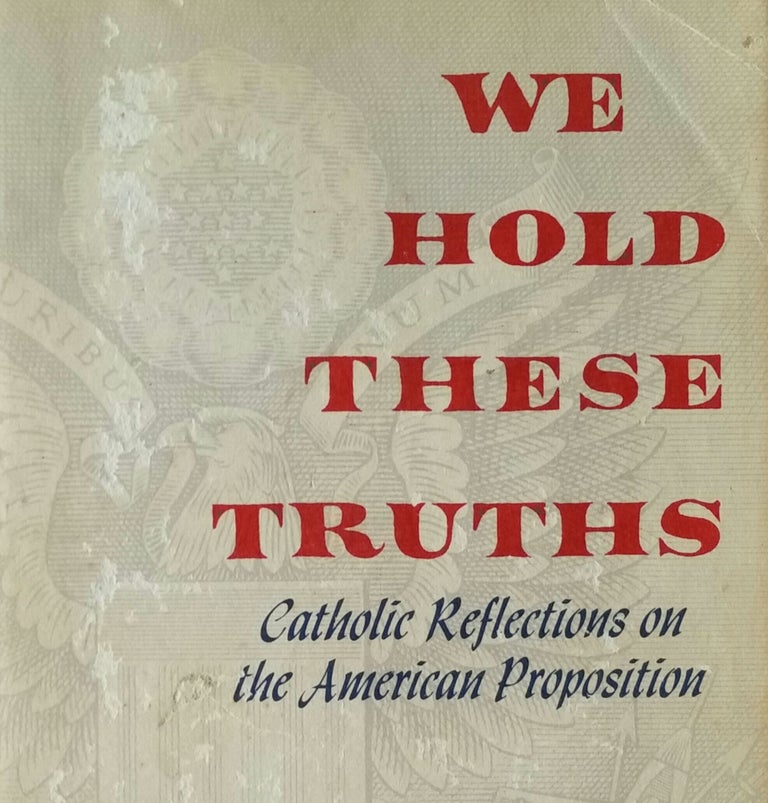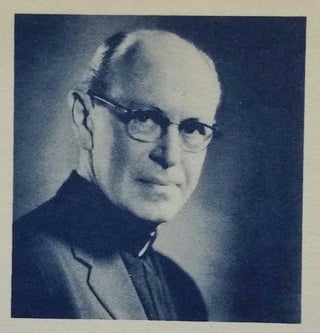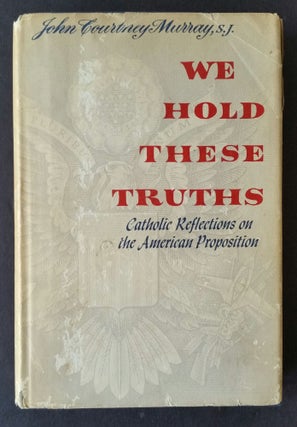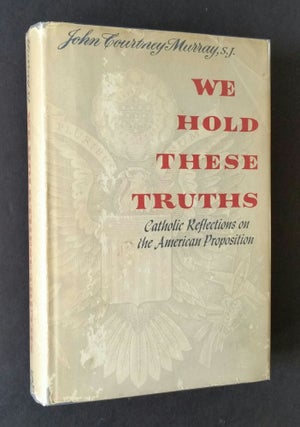We Hold These Truths; Catholic Reflections on the American Proposition
New York: Sheed and Ward, 1960. First edition. Octavo, original half gray cloth, original dust jacket. Faint ink-stamp to free front endpaper, single sentence underlined in ink, very good dust jacket with mild edge-wear and a toned and chipped spine. Very good indeed. Item #391
"THE AMERICAN PROPOSITION RESTS ON THE MORE TRADITIONAL CONVICTION THAT THERE ARE TRUTHS"
Uncommon first edition of the noted American Jesuit's landmark study of "the American Proposition," the basis for his subsequent contributions to the ideals of religious freedom at the Second Vatican Council. Now scarce in the original dust jacket.
Murray's work on the relationship between the City of God and the City of Man is "a study of the issues in American political philosophy of special relevance to the place of the Catholic Church in American life." (George McLean). Murray contended that the Catholic Tradition had always represented the fundamental truths of the West essential to molding a modern American pluralism: "the American Proposition rests on the more traditional conviction that there are truths; that they can be known; that they must be held; for, if they are not held, assented to, consented to, worked into the texture of institutions, there can be no hope of founding a true City, in which men may dwell in dignity, peace, unity, justice, well-being, freedom." The thirteen essays are divided into three parts: Part One. The American Proposition, Part Two. Four Unfinished Arguments, Part Three. The Uses of Doctrine. With Murray's Foreword and Introduction, The Civilization of the Pluralist Society. The year 1960 must have been a gratifying one for Fr. Murray. Tainted by "Americanism" and silenced by his superiors in the mid-1950's, he re-emerged with the publication of his book, a contribution to John F. Kennedy's pre-election speech to Protestant ministers in Houston, and an appearance on the cover of Time magazine in December.
Murray was "dis-invited" to the opening session of the Second Vatican Council. But he was brought to Rome in 1963 for the second session as an adviser to Francis Cardinal Spellman. Murray was a principal author in the drafting of Dignitatis Humanae, the Council's Declaration on Religious Freedom where he expanded on his work on the rights of the human person: "As a citizen of two cities--as an American and as a Catholic--Fr. Murray saw the rights of the religious believer, being defined by the Declaration on Religious Freedom, and those of the American citizen being defined by the U. S. Constitution. Given this context, he was of the opinion that the American legal order did not and could not restrain the believer from holding and exercising this dual citizenship in an active and public fashion" (Robert John Araujo, S.J., John Courtney Murray, S.J.: A Citizen of Two Cities). Rare in the original dust jacket (designed by Arno). McLean, An Annotated Bibliography of Philosophy in Catholic Thought 1900-1964, 224. Approbations.
Price: $50.00




